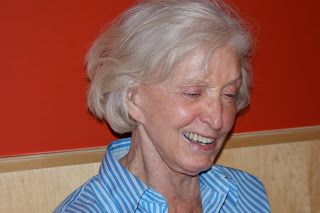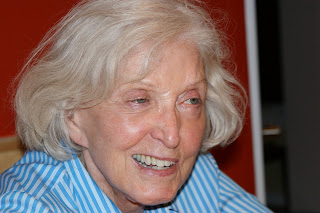Mother remembers her first day at school

"She was wearing a black sweater," she said, "and I wanted her not to wear that. I wanted her to wear something pretty. Like a pink sweater."
Mother was talking about her first day of school. This was Maia's first day of first grade, and it had gotten her to thinking. Mother had turned our dinner tonight--I had barbecued some steaks--into a celebration of Maia's first day.
It had been a rough day for Maia. We couldn't get her to talk about it. She had pushed us away when we had accompanied her to the playground for a little play after school and was generally obnoxious at home.
"You were embarassed?" I wanted to know.

"Yes," she said. "I wanted her to take it off when we got there," she said, "but she wouldn't."
She thought some more about that day.
"I was only five," she said, "but they let me in."
"Were you the youngest?" I wanted to know.
"Yes," she said. "But I knew how to read and write. Momma taught me on the Old Majestic."

She laughed about it, remembering.
"it was an old nickel stove," she said, "and the warm side would dry off as soon as you wiped it. Momma would call out numbers or words," she said, "and I would write them."
"What did you write with?" I asked.
"Chalk," she said. "The oldest children were all in school, and they brought chalk home."
"After that first day, that teacher took me home with her, and after that, I was some kind of hero," she said. "She didn't take anybody else home. Took me home with her, at least once a month. And Momma let me go," she said.

"Served me green jello," she said. "I didn't like it for nothing, but Momma always said you took whatever anybody gave you and you didn't complain about it, so I ate every bit of it. And then they said, 'You must've really liked that,' and so they gave me some more," she said, laughing about it.

"She lived in Berwyn," she said. "I thought she had the prettiest bedroom. All pink and blue. She was about thirty, and they didn't have any children."
"Where were you living then?" I asked.
"Cucumber," she said. "But then Daddy moved us to New Hall after that first year. To that house on that ridge," she said. "Never saw her again," she said.
She was quiet, a little bit, reflecting. Then she laughed again, thinking about the house.

"They hadn't painted the inside," she said. "Papered it with old newspaper. None of us had seen anything like it. Momma was so mad at Daddy," she said. "Said she'd never seen anything like it."

"Opal and June and Bernard would read the funny papers on the walls and laugh," she said. "Later, when we moved to William Poca, the boy next door came over because he was sweet on Opal. Asked us if we wanted to read the comics, and we didn't know what he was talking about. We ran to Momma and asked her. 'Why, the funny papers,' she said. We thought he was putting on airs, calling them comics, trying to act highfalutin."

"What was her name?" I asked her later.

"You mean my teacher?" she asked. "Mrs. Brown. I didn't think about it till just now," she said, "but that must have been why I called that tree, 'Mrs. Brown.'"
There were two trees behind the house on that ridge in New Hall, and she had played with them.

"Called the other one, 'Mrs. Green,' she said. "They were my friends. I had long conversations with them," she said, laughing about it. "If anybody ever saw me, they would've thought I was crazy," she said.
"That house burned down."
Years later, we had gone to see that house during one of our 'road trips' to West Virginia, but it was gone.
Cucumber and New Hall are towns in McDowell County, the southernmost county in West Virginia. Cucumber has a couple dozen houses. New Hall is nothing more than a wide spot in the road. There's a group of maybe ten houses and an old school house for the children from the hinterland, long since abandoned and converted to a non-profit. The ridge my mother talked about was about a mile away from the hamlet. There was no drive to where their house was, and you had to climb up the ridge to get to it.
They had moved to that house at the height of the Great Depression because there was land there that they could cultivate and grow food on. My Uncle Bernard was the one who mostly saw to that. To hear my mother tell it, my grandfather's main contribution was his winnings from gambling. "He played pool and he shot," she said. "Turkey shoots. He must've been a pretty good shot," she said, "because we always had turkeys, and we didn't grow them." More rueful laughter.
It dawned on me during one of our roadtrips that my mother's family was one of the very poorest in one of the very poorest counties in the nation during the Great Depression.
I hope we can get back there again.
John, Wednesday, July 30, 2008.
